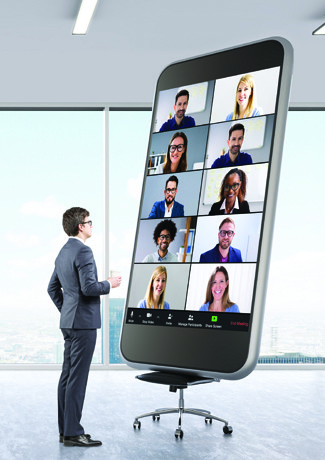
How the transition from face-to-face events to the virtual world succeeds
...and suddenly everything went digital
Ralf Vinzenz Bigge, Managing Director of EICe Aachen GmbH and Cluster Manager of the Smart Logistics Cluster at RWTH Aachen Campus with Marion Riemer, Public Relations in Communications Management, FIR e. V. at RWTH Aachen UniversityPublished in: DiALOG - THE MAGAZINE FOR DIGITAL CHANGE | 2021
Lockdown, contact restrictions, homeschooling - Corona fundamentally changed our everyday lives in one fell swoop. Overnight, there was also an acceptance of digital communication instead of spatial presence. The changeover was not just a question of technology and tools. In order to maintain the dialog with employees, customers and partners, organizational, legal and social framework conditions must be taken into account, demand-oriented formats defined and efficient implementation ensured.
The Cluster Smart Logistics Academy, which bundles the range of events and further training offered by FIR and the centers in the Smart Logistics Cluster on the RWTH Aachen Campus, also went through this learning process.

With 15,000 to 20,000 visitors annually, the conference center in the Smart Logistics Cluster on the RWTH Aachen Campus was a place to meet and be inspired. Since March 2020 at the latest, face-to-face events are either not possible at all or only in compliance with strict conditions. This gave rise to initial thoughts on new formats and the organization of virtual events.
Implementation of mobile work
Many companies took immediate measures such as travel bans and "mobile working" to avoid contact.
Technology and applications
In addition to mobile workplace equipment, the number of external network access points had to be increased to enable smooth access to network resources and collaborative working. Instant messaging services have become more important for easy and quick exchanges.
Teams? Zoom? GoToMeeting? - Free licenses offer a quick start. But which platform is the best is determined not only by the range of functions, but also by security aspects and data protection guidelines. To comply with corporate policy, further developments of existing systems may also be necessary.
Social integration
The role of people in this new system of work and interaction is a crucial one. crucial. Especially the care for employees while maintaining business operations gains even more relevance. Many lack the important social contact with colleagues - at the coffee machine, at the desk next door. The situation at home is also often particularly stressful with homeschooling and caring for small children. Employees need to be aware of their demands in terms of working hours, organization and communication, for example, in order to ensure their health, satisfaction and performance in this situation as well.
From one day to the next, there was also acceptance of digital communication instead of physical presence.
Planning and agenda
The schedule and agenda for digital events follow different rules that must be taken into account during the planning stage:
- Joining the meeting with active camera and muting the microphone avoids disturbing effects.
- The choice of platform depends on the number of participants; sufficient transmission bandwidth must be ensured. A high-quality microphone as well as optimal illumination of the transmitted environment, e.g. with special ring lamps, are part of a professional performance.
- If external speakers are used, it is recommended that their presentation be provided locally and that control be transferred to them at the appropriate time.
- In the case of larger event formats, it is advisable to draw up a stage management plan and conduct a dress rehearsal.
- Chat functions or feedback via emoji replace gestures and facial expressions of the audience in online sessions and make it possible to capture the reactions of the participants.
- To keep participants on the ball, it is advisable to follow a structured time schedule: Video conferences with a maximum length of 50 minutes have proven to be effective; there should be a 10-minute break before the next sequence for drinks, fresh air or some exercise.
New formats
After more than a year, many things that were new at the beginning are now part of everyday life. The training formats of the Smart Logistics Academy cluster have also been adapted to digital and hybrid offerings and are being well received. In the context of research projects and current industry projects, further online formats were created, for example on the current topics of New Industrial Work and New Learning.
Compensation
Is it worth it? While the equivalent value of a face-to-face event in the form of information, people, space, technology and hospitality is easy to measure, digital formats require a great deal of judgment in defining the participation fee. According to media reports, 30-50% of the price of face-to-face events seems to be acceptable.
Constantly optimize
With each passing day, experience grows as to which formats are suitable for which communication goal; instant messaging services for short-term information exchange, collaboration platforms for recurring exchange, knowledge transfer via learning platforms, webinar applications for online seminars and conference tools for large events.
Venues and technology also depend on the event format. With a suitable camera, lighting technology and microphones as well as "streaming tools", the conference room mutates into a study. For the online meeting, your own notebook with integrated camera and, if necessary, headset is sufficient, although care must always be taken to ensure a quiet environment. A virtual background in your own corporate design enhances the professional effect. Start on time or notify your interlocutors in case of delays. Always look directly into the camera during the conference and avoid doing other things on the side. This will ensure that you stay in the conversation and can seamlessly transition to the post-episode period.
Outlook
The time after Corona
By now, we have become accustomed to the new way of working and have experienced that many tasks and processes can be organized efficiently and cost-effectively using digital methods. But there are still tasks for which meeting in person is the better alternative. It is likely that the number of business trips will not return to pre-Corona levels in the long term. Businesses will continue to use mobile working to some extent in the future for online conferencing, as well as in mobile workplaces. Personally, we believe that our future collaboration, training, conferences and events will be a creative mix of REAL, DIGITAL and HYBRID.

Ralf Vinzenz Bigge is Managing Director EICe Aachen GmbH and Cluster Manager of the Smart Logistics Cluster on the RWTH Aachen Campus. EICe Aachen GmbH is the Enterprise Integration Center as your central contact for the planning and implementation of all event formats - whether digital, hybrid or on-site, for event rooms as well as guided tours in the Smart Logistics Cluster on the RWTH Aachen Campus. The FIR at RWTH Aachen University is a non-profit, cross-industry research and training institution at RWTH Aachen University in the field of business organization, information logistics and enterprise IT with the aim of creating the organizational foundations for the digitally networked industrial enterprise of the future.
https://eice.rwth-campus.com